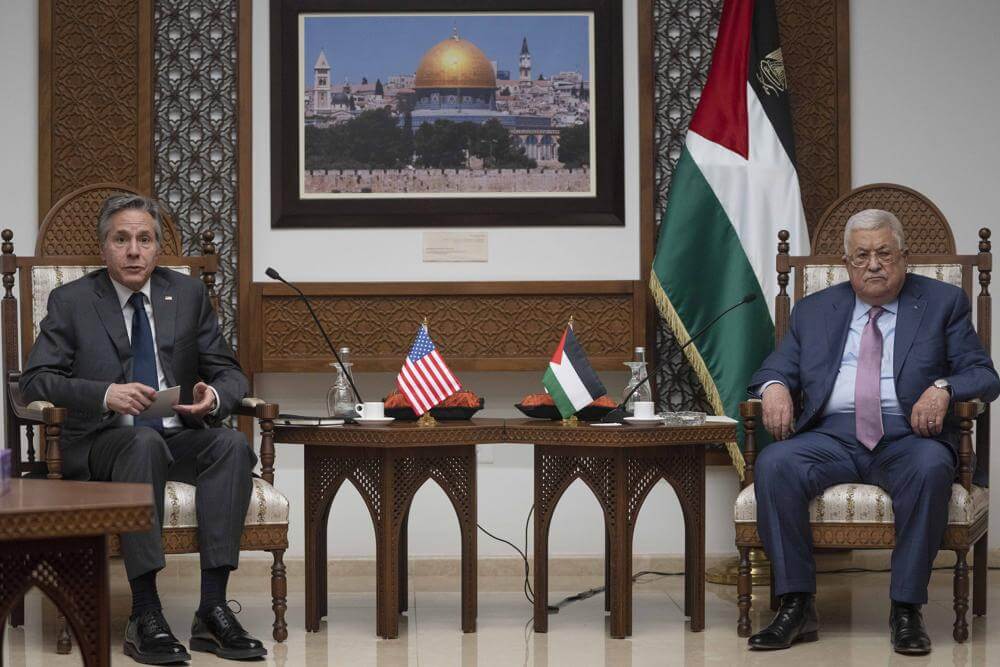United States (US) Secretary of State Antony Blinken on Sunday told Israel that the US will not allow Iran to manufacture a nuclear weapon and promised that both countries will work together in this regard.
“Iran with a nuclear weapon or the capacity to produce one on short notice would become even more aggressive, and would believe it could act with a false sense of impunity,” Blinken told his Israeli counterpart Yair Lapid during a joint press conference in Jerusalem.
Ahead of the #Negev_Summit which will begin later today in Sde Boker, I met with my good friend Secretary of State @SecBlinken in Jerusalem. The relationship between our two countries is unbreakable. The United States is Israel’s closest friend and strongest ally. 🇮🇱 🇺🇸 pic.twitter.com/BP2ILkIuSW
— יאיר לפיד - Yair Lapid🟠 (@yairlapid) March 27, 2022
However, Blinken noted that the best way “to put Iran’s nuclear programme back in the box” is by returning to the 2015 nuclear deal, formally known as the Joint Comprehensive Plan of Action (JCPOA). He also stressed that, whether or not the deal is signed, the US will continue to coordinate closely with Israel. “This cooperation is essential because, beyond its nuclear efforts, Iran continues to engage in a whole series of destabilizing activities across the region,” he noted.
Iran has been using its proxies in Yemen, Lebanon, Syria, and Iraq to attack the US and its allies in the region. In this respect, Blinken said that the US “will continue to stand up to Iran when it threatens us or when it threatens our allies and partners.”
Lapid, on the other hand, said that “Israel will do anything we believe is needed to stop the Iranian nuclear program,” referring to a possible military strike of Iran’s nuclear facilities. “From our point of view, the Iranian threat is not theoretical. The Iranians want to destroy Israel. They will not succeed. We will not let them,” he said.
Lapid also noted that despite disagreements about a nuclear deal with Iran, “Israel and the United States will continue to work together to prevent a nuclear Iran.” Israel remains opposed to any nuclear deal with Iran, as it views Tehran’s nuclear programme as an “existential threat,” especially since Iranian leaders have called for the annihilation of Israel. Iran, however, insists that its nuclear programme is entirely peaceful.
Blinken also met with Prime Minister Naftali Bennett and President Isaac Herzog to discuss Iran, Ukraine, and the two-day Negev Summit in the Israeli city of Sde Boker, where the foreign ministers of Bahrain, Egypt, Morocco, and the United Arab Emirates will be joining Lapid and Blinken.
Wonderful to meet with Israeli Prime Minister @naftalibennett. We discussed regional and global challenges, including President Putin’s brutal war in Ukraine. In these difficult times, the U.S.-Israel partnership is stronger than ever. pic.twitter.com/D9CArUQucK
— Secretary Antony Blinken (@SecBlinken) March 27, 2022
After meeting with Israeli officials, Bennett visited Ramallah in the West Bank, where he told Palestinian Authority (PA) President Mahmoud Abbas that the US is “committed to rebuilding our relationship” with the Palestinians. Accordingly, Blinken said that Washington will resume funding for the United Nations Relief and Works Agency for Palestinian Refugees (UNRWA); the US stopped funding the Organisation in 2018 under the previous Trump presidency.
Blinken also promised that the US will work to “prevent actions by either side that could raise tensions,” including settlement expansion, home demolitions, payments to terrorists, and incitement to violence.
Productive meeting with Palestinian Authority President Mahmoud Abbas today to reaffirm the importance of the U.S.-Palestinian relationship. The U.S. is committed to a two-state solution and the need to improve the quality of life for the Palestinian people. pic.twitter.com/IBrfvPAoft
— Secretary Antony Blinken (@SecBlinken) March 27, 2022
Stressing that Palestine has adhered to “the path of peaceful popular resistance,” Abbas accused the West of “double standards” when it comes to Israeli “crimes” against the Palestinians. He said that while the US and Europe have been quick to punish Russia for its invasion of Ukraine, they continue to ignore Israel’s occupation of Palestinian territory.
“The latest incidents in Europe have proven that there are double standards being flagrantly observed around the world,” Abbas noted, adding that despite Israel’s human rights violations, “we don’t find any party that would hold Israel accountable for its actions as it acts as a state above all law.”
“What is happening in Palestine is something that we cannot be silent about, and international law cannot be partitioned or divided,” he declared.
Blinken’s visit to Israel and Palestine is part of his wider tour of the Middle East and North Africa. Blinken will visit Morocco and Algeria in the coming days to discuss human rights, humanitarian aid, and the Russia-Ukraine conflict.

